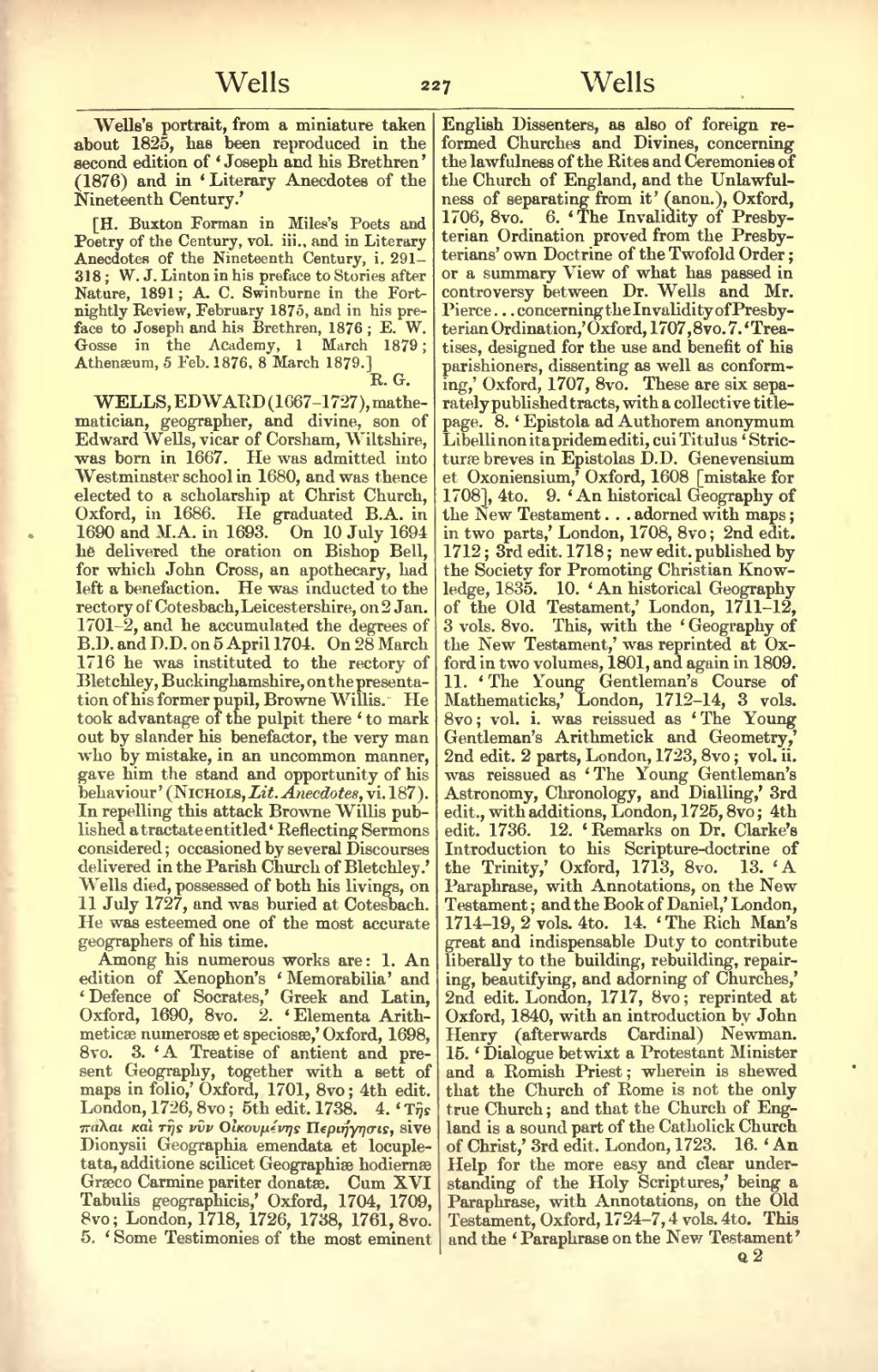Wells's portrait, from a miniature taken about 1825, has been reproduced in the second edition of ‘Joseph and his Brethren’ (1876) and in ‘Literary Anecdotes of the Nineteenth Century.’ A new edition of ‘Joseph,’ with essays by Theodore Watts-Dunton and A. C. Swinburne, was issued in ‘The World's Classics’ in 1908.
[H. Buxton Forman in Miles's Poets of the Century, vol. iii., and in Lit. Anecd. of 19th Century, i. 291–318; W. J. Linton in Stories after Nature, 1891; A. C. Swinburne in Fortnightly Rev. Feb. 1875, and in Joseph and his Brethren, 1876; Academy, 1 Mar. 1879 (by Edmund Gosse); Athenæum, 5 Feb. 1876, 8 Mar. 1879.]
WELLS, EDWARD (1667–1727), mathematician, geographer, and divine, son of Edward Wells, vicar of Corsham, Wiltshire, was born in 1667. He was admitted into Westminster school in 1680, and was thence elected to a scholarship at Christ Church, Oxford, in 1686. He graduated B.A. in 1690 and M.A. in 1693. On 10 July 1694 he delivered the oration on Bishop Bell, for which John Cross, an apothecary, had left a benefaction. He was inducted to the rectory of Cotesbach, Leicestershire, on 2 Jan. 1701–2, and he accumulated the degrees of B.D. and D.D. on 5 April 1704. On 28 March 1716 he was instituted to the rectory of Bletchley, Buckinghamshire, on the presentation of his former pupil, Browne Willis. He took advantage of the pulpit there ‘to mark out by slander his benefactor, the very man who by mistake, in an uncommon manner, gave him the stand and opportunity of his behaviour’ (Nichols, Lit. Anecdotes, vi. 187). In repelling this attack Browne Willis published a tractate entitled ‘Reflecting Sermons considered; occasioned by several Discourses delivered in the Parish Church of Bletchley.’ Wells died, possessed of both his livings, on 11 July 1727, and was buried at Cotesbach. He was esteemed one of the most accurate geographers of his time.
Among his numerous works are: 1. An edition of Xenophon's ‘Memorabilia’ and ‘Defence of Socrates,’ Greek and Latin, Oxford, 1690, 8vo. 2. ‘Elementa Arithmeticæ numerosæ et speciosæ,’ Oxford, 1698, 8vo. 3. ‘A Treatise of antient and present Geography, together with a sett of maps in folio,’ Oxford, 1701, 8vo; 4th edit. London, 1726, 8vo; 5th edit. 1738. 4. ‘Tῆς πάλαι και τῆς νῦν Oἰκουμένης Περιήγησις, sive Dionysii Geographia emendata et locupletata, additione scilicet Geographiæ hodiernæ Græco Carmine pariter donatæ. Cum XVI Tabulis geographicis,’ Oxford, 1704, 1709, 8vo; London, 1718, 1726, 1738, 1761, 8vo. 5. ‘Some Testimonies of the most eminent English Dissenters, as also of foreign reformed Churches and Divines, concerning the lawfulness of the Rites and Ceremonies of the Church of England, and the Unlawfulness of separating from it’ (anon.), Oxford, 1706, 8vo. 6. ‘The Invalidity of Presbyterian Ordination proved from the Presbyterians' own Doctrine of the Twofold Order; or a summary View of what has passed in controversy between Dr. Wells and Mr. Pierce … concerning the Invalidity of Presbyterian Ordination,’ Oxford, 1707, 8vo. 7. ‘Treatises, designed for the use and benefit of his parishioners, dissenting as well as conforming,’ Oxford, 1707, 8vo. These are six separately published tracts, with a collective title-page. 8. ‘Epistola ad Authorem anonymum Libelli non ita pridem editi, cui Titulus ‘Stricturæ breves in Epistolas D.D. Genevensium et Oxoniensium,’ Oxford, 1608 [mistake for 1708], 4to. 9. ‘An historical Geography of the New Testament … adorned with maps; in two parts,’ London, 1708, 8vo; 2nd edit. 1712; 3rd edit. 1718; new edit. published by the Society for Promoting Christian Knowledge, 1835. 10. ‘An historical Geography of the Old Testament,’ London, 1711–12, 3 vols. 8vo. This, with the ‘Geography of the New Testament,’ was reprinted at Oxford in two volumes, 1801, and again in 1809. 11. ‘The Young Gentleman's Course of Mathematicks,’ London, 1712–14, 3 vols. 8vo; vol. i. was reissued as ‘The Young Gentleman's Arithmetick and Geometry,’ 2nd edit. 2 parts, London, 1723, 8vo; vol. ii. was reissued as ‘The Young Gentleman's Astronomy, Chronology, and Dialling,’ 3rd edit., with additions, London, 1725, 8vo; 4th edit. 1736. 12. ‘Remarks on Dr. Clarke's Introduction to his Scripture-doctrine of the Trinity,’ Oxford, 1713, 8vo. 13. ‘A Paraphrase, with Annotations, on the New Testament; and the Book of Daniel,’ London, 1714–19, 2 vols. 4to. 14. ‘The Rich Man's great and indispensable Duty to contribute liberally to the building, rebuilding, repairing, beautifying, and adorning of Churches,’ 2nd edit. London, 1717, 8vo; reprinted at Oxford, 1840, with an introduction by John Henry (afterwards Cardinal) Newman. 15. ‘Dialogue betwixt a Protestant Minister and a Romish Priest; wherein is shewed that the Church of Rome is not the only true Church; and that the Church of England is a sound part of the Catholick Church of Christ,’ 3rd edit. London, 1723. 16. ‘An Help for the more easy and clear understanding of the Holy Scriptures,’ being a Paraphrase, with Annotations, on the Old Testament, Oxford, 1724–7, 4 vols. 4to. This and the ‘Paraphrase on the New Testament’

